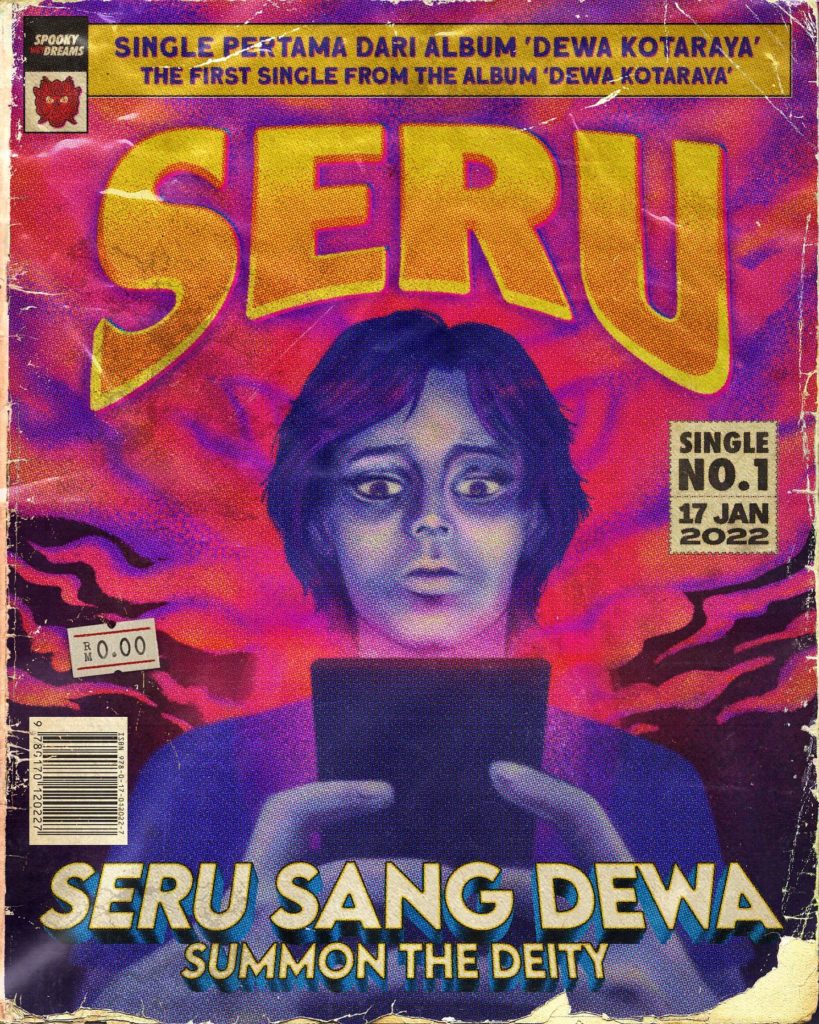
Klang-based indie rock/alternative band Spooky Wet Dreams summons all its strength to fight burnout in its single, 'Seru'.
By IZELEA IZHAM for LENSA SENI
Work burnout is an all too familiar experience for most folks. We live in a time where hustle culture is more prevalent than ever; add to that the uncertainty and anxieties of adulthood and navigating career conundrums during a pandemic, and we are expected to slave away to make ends meet. Side gigs – additional jobs on top of full-time day jobs are nothing new. Our energies are sapped away, leaving us burnt out and feeling hopeless.
The band Spooky Wet Dreams approaches this with all its heart in its latest pop ballad, Seru, a taste of what’s to come from its upcoming album Dewa Kotaraya. Centered around the modern working life in the city, Seru is about gathering all your strength just to make it through each day, without succumbing to burnout.
The 6-piece indie rock/alternative band formed in 2015 from Klang Valley has always sung about issues that are close to each bandmember’s – Shazwan Zulkiffli, Shazwani Zulkiffli, Salihin Rizal, Aqil Nasri, Matt Liew and Aiman Sulhi – hearts as well as the hearts of their fellow Malaysians. Their stories revolve around Malaysia; its people, culture, politics, love, education, revolution and everything in between.
This time around, Seru is the band’s take on struggling with burnout. It’s about maximizing our energies and hard work just to make it. It’s about summoning all your strength to pull through each day. It’s a plea to make things just a little easier for us as we’re fighting for our lives.

The piano intro perfectly captures the aching essence of this track. The tone conveys feelings of hopelessness and melancholy, inviting audiences to listen in closely and hoping that they would empathise with the same growing pains.
The strongest, most magical part of Seru lies in its songwriting. It starts off with the crushing weight of expectations and burdens of overworking and trying to make ends meet. It’s about life in the concrete jungle and the soul-crushing pressures of the society, of the workplace, yet having to push through just for a better life and the hopes of reaching our dreams, no matter how high up they seem to be. But will peace and stability ever be of reach?
The most heartbreaking lines perhaps come from the words below: “Tika cahaya terakhir ku padam/ Siapa yang ada/ Menggenggam tanganku”, which translates into: “When my last light goes out/ Who will be there to hold my hand?”
Struggling with burnout is also about combating loneliness. At the end of the day, we are the ones in our own journey defining our paths and end goals. Everyone is going through their own battle. And sometimes, you just can’t help but feel so alone. Fighting this loneliness in a city full of noise can be isolating. You can hear it in the vocals that this is a cry for help.
In the end, it alludes to this vicious cycle that we have to endure, and at some point admit defeat. “Jika kudrat tak cukup, ku kan tutupkan lampu… mungkin malam ini tiada rezeki, kita rehat dahulu, esok kita cuba lagi”. If whatever we give is not enough, even if it was our best, maybe luck wasn’t in our hands. It offers a glimmer of hope that maybe, just maybe, it will all work out. If all else fails, tomorrow is a new day; not all hope is lost and esok kita cuba lagi (tomorrow we will try again).
As you go on listening to the song, you might notice that there is no chorus as opposed to the usual structure of songwriting. This is what makes the song so interesting and makes it stand out even more. Perhaps this is a jab at the cycle we have to go through in life, where we fall and get back up again, doing whatever we can with everything we’ve got just to make it.
Another eye-catching aspect of Seru is its visual aesthetic. For starters, the track has a very nostalgic, retro ballad ring to it and the music video reflects just that. The opening credits resemble that of a classic black and white film, interspersed with close-up shots of the band members singing and performing in monochrome with multiple exposure effects as famously seen in Alfred Hitchcock films.
This monochrome style of music video seems like a great homage to film noir, but what makes it an interesting choice is that black and white films oftentimes portray feelings of sadness, despair, and bring out emotions on such a different level. Seru encapsulates this experience.
When it comes to visuals, a track’s cover artwork is essential to its release. Seru’s artwork sees a character clearly exhausted and pictured like a zombie with their eyes glued to the screen, very well capturing the state of today’s modern community. According to Spooky Wet Dream’s Instagram post featuring the artwork’s designers Lizzie Zany and Mimi Jamal, the cover art is based on the pulp fiction genre, inspired by long-running Malaysian magazine Mastika as well as famed children’s series Mr Midnight, with haunting, retro pop art.
The words conveyed in Seru paired with its melancholic, haunting tune and visuals makes a powerful combination. A song has the ability to propel and stir feelings and emotions and tell stories. With Seru, Spooky Wet Dreams shows that they are with us, making us feel a little less lonely.
Seru is out now on major streaming platforms. Be sure to follow Spooky Wet Dreams on Instagram, Twitter, Facebook and YouTube for more updates.
Izelea Izham is a participant in the CENDANA ARTS WRITING MASTERCLASS & MENTORSHIP PROGRAMME 2021
The views and opinions expressed in this article are strictly the author’s own and do not reflect those of CENDANA. CENDANA reserves the right to be excluded from any liabilities, losses, damages, defaults, and/or intellectual property infringements caused by the views and opinions expressed by the author in this article at all times, during or after publication, whether on this website or any other platforms hosted by CENDANA or if said opinions/views are republished on third party platforms.
